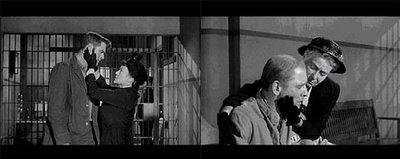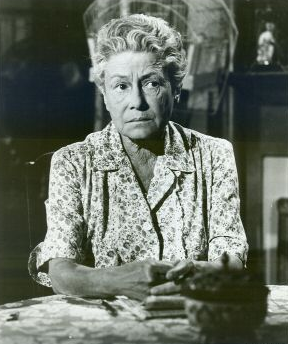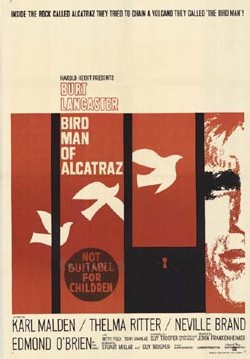 If ever there were a holy icon for actressing at the edges, Thelma Ritter would likely have been so canonized. Laboring in character roles at the outskirts of films of every pedigree, Thelma Ritter both maintains the record for most nominations in this category (6 in 12 years) while also having suffered the noblest Oscar ignominy (accumulating a raft of nominations but not a single trophy). Indeed, so ubiquitous is Ritter as a Supporting Actress nominee that Lulu sometimes forgets she's one of Oscar's biggest losers. So, among actresses at the edges, Thelma Ritter's sacrifice and martyrdom at the hands of Oscar do certainly qualify her for a curious kind of Supporting Actress sainthood.
If ever there were a holy icon for actressing at the edges, Thelma Ritter would likely have been so canonized. Laboring in character roles at the outskirts of films of every pedigree, Thelma Ritter both maintains the record for most nominations in this category (6 in 12 years) while also having suffered the noblest Oscar ignominy (accumulating a raft of nominations but not a single trophy). Indeed, so ubiquitous is Ritter as a Supporting Actress nominee that Lulu sometimes forgets she's one of Oscar's biggest losers. So, among actresses at the edges, Thelma Ritter's sacrifice and martyrdom at the hands of Oscar do certainly qualify her for a curious kind of Supporting Actress sainthood.Supporting Actress aficionado Canadian Ken recently observed, when discussing Ritter's overlooked performance in 1961's The Misfits, that "Oscar voters recognized [Ritter] regularly. But, to my mind, they often nominated the wrong performances." Such would seem to be the case for her work as Elizabeth Stroud, the mother of real-life lifer Robert Stroud, the performance which accomplished Oscar's final nomination for...
10 minutes & 30 seconds "on" screen (including 23 second voiceover)
7 scenes (w/voiceover & counting first petition sequence as 1 scene)
7% of film's total screen time
7 scenes (w/voiceover & counting first petition sequence as 1 scene)
7% of film's total screen time
Thelma Ritter's Mrs. Stroud is a force to be reckoned with. Intensely protective of her imprisoned Robert, Ritter's Mrs. Stroud's devotion nearly defines her son (played here with tedious righteousness by the nearly awful Burt Lancaster). For a good two thirds of the picture, Robert Stroud's character is implicitly defined by the obtuse relationship he maintains with his mother. The audience knows little (and Lancaster's performance gives nary a clue) about the man 'cept that he's a murderer with a genius IQ and an anger-management problem. And that he loves his mother. (So much so that he kills a prison guard who thwarts a visit from her.)
 Ritter's Mrs. Stroud contributes a powerful offscreen presence which punctuates, often detrimentally, the arc of her son's story. Indeed, references to the character of Mrs. Stroud prove pivotal, even focal, to 6 scenes in which the actress herself does not even appear. The relationship between Stroud and his mother remains one of the very few the film explores with any interest and, even with Ritter to anchor the volley, its impact is truncated by the trudge of the narrative. (The film itself is bio-pic pablum, which seems to provide/refine the formulaic template for both the super-serious man-finds-his-soul-in-prison movie genre (exhibit A & B) AND the Lifetime "trauma drama". Director John Frankenheimer's visual flair only occasionally elevates the flick above its preening sincerity.)
Ritter's Mrs. Stroud contributes a powerful offscreen presence which punctuates, often detrimentally, the arc of her son's story. Indeed, references to the character of Mrs. Stroud prove pivotal, even focal, to 6 scenes in which the actress herself does not even appear. The relationship between Stroud and his mother remains one of the very few the film explores with any interest and, even with Ritter to anchor the volley, its impact is truncated by the trudge of the narrative. (The film itself is bio-pic pablum, which seems to provide/refine the formulaic template for both the super-serious man-finds-his-soul-in-prison movie genre (exhibit A & B) AND the Lifetime "trauma drama". Director John Frankenheimer's visual flair only occasionally elevates the flick above its preening sincerity.)For her part, when she's on-screen, Thelma Ritter's Mrs. Stroud is classic Ritter: a solid -- somewhat soiled -- rock (salt-of-the-earth, to be sure). At once humble and noble, Ritter's Mrs. Stroud emerges as the kind of woman to both rant impolitic in court at the injustice of capital punishment and also capable of campaigning all the way to First Lady Edith Wilson to snag a stay of execution for her beloved son.
 Yet, even from its first note, Ritter's performance cues an uneasy suspicion that there's something a little "off" about Mrs. Stroud's passion for keeping her son alive and imprisoned, one clinging to the other as they each grey and crust over. And when her son marries a widowed bird woman, Ritter's Mrs. Stroud quickly morphs into an exacting, infantilizing monster mother (though it is to Ritter's credit that this transmogrification errs away from the spectacular and centers upon Mrs. Stroud's fearful, heartsick desperation.) As her Mrs. Stroud finally abandons and disavows her son out of misplaced pride, Thelma Ritter also contributes this film's only honest moments of poignancy. (Too bad the film just rushes right along past them.) Hers is a characteristically solid and specific performance -- extraordinary in its ordinariness -- and just the sort that reminds StinkyLulu why Thelma Ritter's such an icon of actressing at the edges. Can't say Lulu loved the performance, but golly StinkyLu does love LaRitter...
Yet, even from its first note, Ritter's performance cues an uneasy suspicion that there's something a little "off" about Mrs. Stroud's passion for keeping her son alive and imprisoned, one clinging to the other as they each grey and crust over. And when her son marries a widowed bird woman, Ritter's Mrs. Stroud quickly morphs into an exacting, infantilizing monster mother (though it is to Ritter's credit that this transmogrification errs away from the spectacular and centers upon Mrs. Stroud's fearful, heartsick desperation.) As her Mrs. Stroud finally abandons and disavows her son out of misplaced pride, Thelma Ritter also contributes this film's only honest moments of poignancy. (Too bad the film just rushes right along past them.) Hers is a characteristically solid and specific performance -- extraordinary in its ordinariness -- and just the sort that reminds StinkyLulu why Thelma Ritter's such an icon of actressing at the edges. Can't say Lulu loved the performance, but golly StinkyLu does love LaRitter...


No comments:
Post a Comment